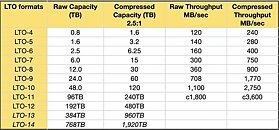- Joined
- Aug 19, 2017
- Messages
- 3,248 (1.12/day)
Fujifilm, a Japanese company focused on photography, imaging, printing, and biotechnology, predicts that it can build a 400 terabyte cartridge using Strontium Ferrite (SrFe) technology. Thanks to a report by Blocks&Files, who was press-briefed by Fujifilm, we have some information on the future of tape storage. Tape storage uses Linear Tape-Open (LTO) technology, which is an open standard developed by IBM to ensure all tape-based storage devices use the same format, instead of proprietary magnetic formats. We are currently at the LTO-8 version of this technology, which was released in 2017. Currently, LTO-8 can hold 12 TB in a single cartridge.
Fujifilm, one of the remaining makers of tape storage, predicts that it can pack 400 TB of tape storage in the LTO-13 era. Starting from LTO-12, Fujifilm plans to deploy Strontium Ferrite (SrFe) technology, which is different from the current Barium Ferrite (BaFe). The problem with BaFe is that each new LTO generation uses smaller and smaller particles and that leads to some problems where a tape bit value can't be read, and magnetic polarities would be disturbed if particles get too small. 400 TB tape drives using LTO-13 should be in circulation around 2032/33 according to a Blocks&Files prediction. Below you can check out the table provided by Blocks&Files that shows LTO generations and their abilities.


View at TechPowerUp Main Site
Fujifilm, one of the remaining makers of tape storage, predicts that it can pack 400 TB of tape storage in the LTO-13 era. Starting from LTO-12, Fujifilm plans to deploy Strontium Ferrite (SrFe) technology, which is different from the current Barium Ferrite (BaFe). The problem with BaFe is that each new LTO generation uses smaller and smaller particles and that leads to some problems where a tape bit value can't be read, and magnetic polarities would be disturbed if particles get too small. 400 TB tape drives using LTO-13 should be in circulation around 2032/33 according to a Blocks&Files prediction. Below you can check out the table provided by Blocks&Files that shows LTO generations and their abilities.


View at TechPowerUp Main Site


